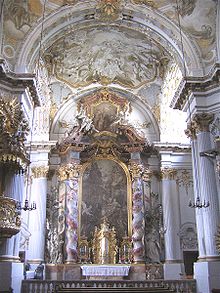48°08′14″N 11°34′9″E / 48.13722°N 11.56917°E / 48.13722; 11.56917



Damenstiftskirche St. Anna is a chapel in Munich, southern Germany.
It was commissioned in the 18th century by Elector Charles Albert (later the Emperor Charles VII) and the cornerstone was laid in 1733. A monastery in the legal form of a chapter of nuns was set up. The architect was Johann Baptist Gunetzrhainer, while the Asam brothers were responsible for the interior. The women's collegiate church was consecrated in 1735.
All but the outer walls were destroyed in World War II. The interior was restored from old photographs in 1980, but the murals are now painted in black and white.
FSSP Apostolate
On 1 September 2014, Reinhard Cardinal Marx, Metropolitan Archbishop of München und Freising, entrusted the Chapel to the Priestly Fraternity of St Peter (FSSP) permanently.
Since this time, daily Mass has been offered in the Extraordinary Form of the Roman Rite, at the Chapel exclusively.
References
- Lieb, N. (1988). München: die Geschichte seiner Kunst (in German). Callwey. p. 335. ISBN 978-3-7667-0905-9. Retrieved 21 June 2018.
- Travel, DK (2017). Top 10 Munich. DK Eyewitness Travel Guide (in German). Dorling Kindersley Limited. p. 125. ISBN 978-0-241-34399-9. Retrieved 21 June 2018.
- "The Unstoppable Traditional Mass: Around the world with the TLM". RORATE CÆLI. Retrieved 21 June 2018.
Sources
As of this edit, this article uses content from "Chapter of Nuns Monastery Church St. Anna", which is licensed in a way that permits reuse under the Creative Commons Attribution-ShareAlike 3.0 Unported License, but not under the GFDL. All relevant terms must be followed.
External links
This article about a Bavarian building or structure is a stub. You can help Misplaced Pages by expanding it. |
This article about a church building or other Christian place of worship in Germany is a stub. You can help Misplaced Pages by expanding it. |